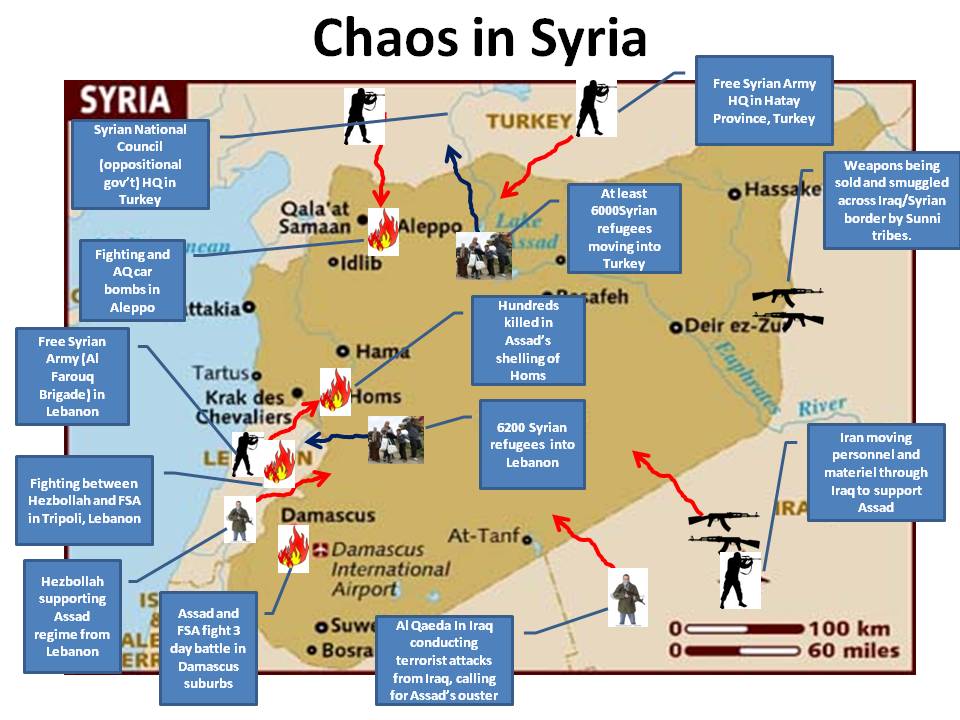The Syrian civil war, which has seen a stalemate for nearly three years, shows no signs of a negotiated political solution. The Geneva II peace talks, that opened on 22 January, are highly unlikely to result in a breakthrough, absent a miracle. There is irreconcilable tension between the oppositional Syrian National Coalitions’s (SNC) demand for a future Syria without President Bashar Al-Assad and Al-Assad government’s policy priority to secure international support to fight what it calls rebellious terrorists. That may well leave a military victory, either by the government or the opposition rebels, as the final option to break out of the deadlock.
If this were to happen, three recent developments seem to favor a possible win by Bashar Al-Assad. First, in recent weeks, government troops have recorded some notable military successes by reversing rebel territorial gains in the south and eastern parts of Syria and by stamping them out from areas adjacent to Damascus. Secondly, the continued infightings between rebel groups, particularly between the Islamic State of Iraq and the Levant (ISIL) and other moderate Islamist groups are damagingly reducing their fighting capacities against government troops. Thirdly, international support for the rebels is gradually drying out. The SNC agreed to join Geneva II peace negotiations after the US and Britain had threatened to withdraw support for them.[1] A win by President Bashar Al-Assad would, however, inevitably affect the interests and strategic matrices of the regional powers deeply involved in the Syrian civil war – Iran, Israel, Qatar, Saudi Arabia and Turkey. This point is explained below by highlighting what drove each of the parties to take sides in the civil war and what they stand to win or lose in Syria if Bashar Al-Assad stays in power.
Iran
The outbreak of armed hostilities in Syria put Iran in a state of flux. Already tired of confronting the West over its nuclear program, Tehran saw the war as a Western and Gulf Arab conspiracy to isolate it regionally and globally, heavily constrain its room for maneuverability and cut off its link to ally Hezbollah.[2] Sensing an impending strategic paralysis, despite gains the US unintentionally produced for Tehran by eliminating its two arch foes – Taliban Afghanistan in the East and Saddam Hussein’s Iraq in the west, the Iranian government responded to the Syrian civil war by siding with the Assad government. The defeat of Assad would mean a much weaker Iran surrounded by Arab adversaries on the west coast of the Persian Gulf, US military bases posing threats from all around, a resurgent Turkey on the north-western borders that has historically competed against Iran and an emboldened Israel that never hid its intentions to militarily strike and destroy Iranian nuclear facilities and infrastructures. That prompted Tehran to send military advisors, arms shipments and economic aid for Assad.[3]
Despite hard economic sufferings at home spawned by unilateral US and EU sanctions, Tehran bankrolled the Assad government by providing $500 million per month plus credit lines to finance food and energy imports[4] Tehran’s ally Hezbollah, driven by similar strategic compulsions, has responded by deploying fighters on Assad’s side. Assad’s possible victory, at the end, will not only compensates Iran’s unwavering support, it will also make Tehran a much emboldened actor vis-à-vis its regional and global adversaries. Assad’s victory may bring a window of economic opportunities for Tehran – the construction of the proposed Iran-Iraq-Syria oil pipeline connecting Iran to the energy markets in the Mediterranean now looks a real possibility.
Israel
Israel and Syria have been technically at war since 1967, the year Tel Aviv occupied the Golan Heights from Damascus and formally annexed it in 1981. But the Ba’athist regime in Damascus, especially after the 1973 Arab–Israel war, has avoided direct confrontation with Israel. Late President Hafez Al-Assad, father of President Bashar Al-Assad, turned Syria into a self-restrained opponent of Israel. The younger Assad, with minor exceptions like the 2006 Hezbollah–Israel war in which he firmly stood behind the Iran-supported Hezbollah fighters, has pursued a similar policy of restraints. The civil war, however, brought unilateral changes to Israel’s Syria policy as it has extended support to the anti-Assad rebels. Nevertheless, Tel Aviv’s ultimate objective was not the immediate removal of Assad but a prolonged civil war that would eventually cut into the vitality of the government as well as the rebel fighters. The Israeli leaders were never sure that a new government in Damascus would be friendly or more hostile, like the Muslim Brotherhood-supported Mohammed Morsi government in Egypt, toward Tel Aviv, apparently though the government and the military view the Iran-Syria-Hezbollah alliance as a greater menace to Israeli security.[5]
An outcome that sees Assad remain in power, however, seriously jeopardizes Israeli strategy. The battle-hardened Syrian army and Hezbollah fighters pose a greater threat to Israel than ever before and there will be little surprise if Damascus, after settling scores with the rebels at home, raises its demands on Golan Heights and undertakes military operations to recapture its territories under Israeli control since 1967. Furthermore, the presence of al-Qaeda and Islamist fighters around its borders creates additional strategic concerns for Israel. To liberate their Palestinian brothers and sisters from Israeli occupation these forces may launch strikes against targets inside the Jewish state. That clearly means Israel is faced with a new specter of threats to its security.
Qatar
Qatari involvement in Syria, spurred by its military operations in Libya alongside NATO, is no less than a political and strategic riddle. A tiny Gulf emirate, roughly equal to the size of the state of Connecticut in the United States, Qatar has attempted to play a much bigger role than its size and demographic strength (fewer than 250,000 citizens) would support. This small state has found itself in the forefront of the Arab pro-democracy movements, with all hard and soft power tools, especially Al Jazeera news channel, at its disposal to politically transform the Arab world. Qatar has sought two principal objectives through its active role in the Arab Spring – promotion of its regional and global leadership profile, and the development of an alliance of Sunni Islamic forces across the Middle East and North Africa, though Doha has no political ideology to export. Qatar has traditionally maintained good relations with the Muslim Brotherhood and hosted Islamist leaders like Sheikh Yusuf al-Qaradawi of Egypt and Ali al-Sallabi of the Libyan Islamic Fighting Group who respectively played prominent roles in the anti-Mubarak and anti-Gaddafi movements. Similarly, Doha has openly sided with the SNC dominated by Muslim Brotherhood leaders who have been the major recipients of Qatar’s massive financial and military aid.[6]
Qatar’s two giant neighbors – Iran and Saudi Arabia have, however, criticized it for military adventurisms in Libya and Syria. While the Iranians lambasted Doha for its role to install a pro-Western government in Damascus, the Saudis disliked Qatar’s support for the Muslim Brotherhood forces in Egypt and Syria, who Riyadh views hostile to the Al Saud rulers.[7] Doha’s inability to change the political landscape in Syria and the evolving hostile relations with Tehran has persuaded the Qatari rulers to rethink their involvement in Syria. The new Emir Sheikh Tamim bin Hamad Al Thani, who ascended to the throne in June 2013, has decided to curtail Qatari high-profile foreign policy role to repair relations with Iran and Saudi Arabia[8] while losing its traditional foreign policy neutrality and millions of dollars for the rebels.
Saudi Arabia
Dictated by its perceived self-interests to confront Iranian influence in the Middle East, Riyadh has supported the majority Sunnis to topple the Assad government, a close strategic ally of Tehran. The Shiite – Sunni divide has had its repercussions on Saudi policy towards Syria as well. Saudi Arabia is a leading Sunni power and sees itself as the defender of the Sunnis everywhere, while Iran has emerged as the leading Shiite power in the Muslim world. It is in Syria where these two Muslim states championing the two rival sects of Islamic religion stood face to face to each other.[9] Guided by its Sunni cult of Wahhabism, a strict version of Islam that brands the Shiites as non-believers or the rejectionists of true Islamic beliefs, Riyadh has firmly upheld the cause of the Sunnis financially, militarily and by sending Saudi Salafist fighters to Syria.[10] Recently, the Saudi government has formed a new front called the Army of Islam, an umbrella organization of 50 jihadist groups, to keep up the fight against the Assad government as well as the al-Qaeda fighters.[11]
Simultaneously, the Saudis have sought direct American intervention or, at least, military strikes on Syria following the 21 August 2013 Al-Ghouta chemical attacks blamed on the government troops. The US decision to militarily stay off the Syrian war and its recent courting of Iran by signing an interim nuclear deal on 24 November 2013 has angered the Saudi rulers who have threatened to act on their own.[12] Given Moscow–Washington cooperation to bring the opposing Syrian parties to the Geneva II peace conference, Saudi Arabia would have stood to lose if it had abandoned Geneva negotiations. Riyadh lacks the capacity to disregard world powers and to follow a unilateral course in Syria.
Turkey
For Turkey the Syrian civil war presented a big dilemma. Prime Minister Recep Tayyip Erdogan’s Islamist government and his AKP party rose to power in 2002 based on democratic politics and practices. Despite the recent crisis in Turkish democracy which resulted in mass anti-government demonstrations, the Syrian people’s fight against dictatorial Assad government was an issue that Turkey could not easily overlook. On the other hand, an unstable Syria, torn apart by violence and conflicts, was likely to encourage Turkey’s minority Kurdish people to advance their separatist aspirations. Turkey’s policy of ‘zero problems’ with the neighboring countries, pursued since 2002 after the AKP party was voted to power, faced a serious crisis. Prime Minister Erdogan vigorously criticized Assad for his brutal handling of the crisis and finally took up the cause of the anti-government forces. Ankara soon became the meeting ground for the SNC, a conduit for supplying military and non-military goods to the FSA and other militant groups, followed the Arab League and the West to impose economic and air traffic sanctions on Damascus and occasionally got involved in cross-border skirmishes. Ankara’s preferred party in the Syrian war, like Qatar, has been the Muslim Brotherhood and it initially supported political reforms in Syria hoping that they would create opportunities for the Brotherhood to capture power peacefully.[13]
Turkey’s maneuvers in Syria did not yield the results due to Iranian and Russian stiff opposition. As the civil war keeps drawing to an end, a post-war Syria with Assad in power would be a bitter pill for Turkey to swallow and Ankara–Damascus relations are unlikely to thaw in the near future. Ankara also stands to lose its booming trade relations with Damascus, which was expected to jump from US $1.844 billion in 2010 to $5 billion in 2012.[14] The Turkey – Syria free trade accord that was put into force on 01 January 2007 has also been put on the shelf after the armed conflict had broken out in March 2011.
Conclusion
To sum up, the Syrian civil war has drastically shaken up the political and strategic environment of the Middle East region. The war has turned Syria into a major breeding ground for terrorism and religious extremism, two unwelcome developments that are likely to impact regional politics and international relations for quite some time to come. All outcomes to the civil war will likely produce a new Syria wrapped up with political and economic glooms and uncertainties. From a cost-benefit analysis viewpoint, while some regional parties have reaped some strategic benefits at a great cost, others stand to lose.








